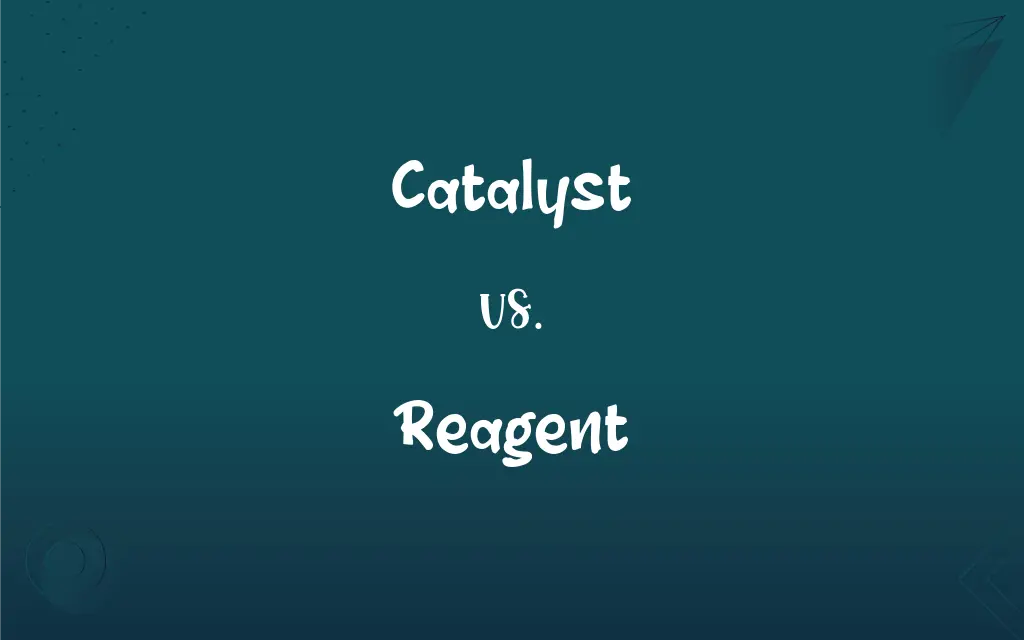Catalyst vs. Reagent: What's the Difference?
Edited by Aimie Carlson || By Janet White || Published on January 6, 2024
A catalyst speeds up a chemical reaction without being consumed, while a reagent is a substance used in a reaction and is consumed or altered during the process.

Key Differences
A catalyst is a substance that accelerates the rate of a chemical reaction without undergoing permanent chemical change itself. A reagent, however, is any substance used in a chemical reaction, usually undergoing chemical change.
Catalysts function by lowering the activation energy of a reaction, making it easier to occur. Reagents are directly involved in the chemical reaction, reacting with other substances.
After the reaction, a catalyst remains chemically unchanged and can be reused. In contrast, reagents are typically consumed or altered during the reaction.
The presence of a catalyst can significantly increase the efficiency of a reaction. Reagents, on the other hand, are essential for driving the reaction forward.
Catalysts are not considered as reactants or products in a chemical equation, while reagents are listed as they directly participate in the reaction.
ADVERTISEMENT
Comparison Chart
Role in Reaction
Speeds up the reaction without being consumed.
Directly participates and undergoes change.
Chemical Change
Remains unchanged after the reaction.
Consumed or altered during the reaction.
Reaction Efficiency
Increases reaction efficiency.
Necessary for the reaction to occur.
Involvement
Facilitates the reaction process.
Reacts with other substances.
Listing in Chemical Equation
Not listed as a reactant or product.
Listed as it is part of the reaction process.
ADVERTISEMENT
Catalyst and Reagent Definitions
Catalyst
Not consumed in the chemical process.
Despite accelerating the reaction, the catalyst remained unaltered.
Reagent
A substance used in a chemical reaction to cause a reaction.
The reagent reacted vigorously with the acid.
Catalyst
Lowers the activation energy of a reaction.
Using a catalyst, the reaction occurred at a lower temperature.
Reagent
Used to bring about a specific chemical reaction.
This reagent is critical for the synthesis of the compound.
Catalyst
Often used in small amounts.
A small amount of catalyst significantly sped up the production process.
Reagent
Typically consumed or altered in the reaction.
After the experiment, the reagent was completely transformed.
Catalyst
A substance that increases the rate of a chemical reaction.
Enzymes act as catalysts in biochemical reactions.
Reagent
Quantitatively participates in the chemical reaction.
The reagent was measured precisely for the experiment.
Catalyst
Does not undergo permanent change in the reaction.
The catalyst was recovered intact after the reaction.
Reagent
Can be a reactant or a substance for analysis.
We added a reagent to test for the presence of glucose.
Catalyst
(Chemistry) A substance, usually used in small amounts relative to the reactants, that modifies and increases the rate of a reaction without being consumed in the process.
Reagent
A substance used in a chemical reaction to detect, measure, examine, or produce other substances.
Reagent
(chemistry) A compound or mixture of compounds used to treat or test materials, samples, other compounds or reactants in a laboratory or sometimes an industrial setting.
Reagent
A substance capable of producing with another a reaction, especially when employed to detect the presence of other bodies; a test.
Reagent
A chemical agent for use in chemical reactions
FAQs
Does a catalyst get used up in a reaction?
No, a catalyst is not consumed in the reaction it facilitates.
How does a catalyst affect activation energy?
A catalyst lowers the activation energy required for a reaction.
Are catalysts specific to certain reactions?
Many catalysts are specific to certain types of reactions.
What is a reagent?
A reagent is a substance used in a chemical reaction, typically undergoing change.
Can a catalyst work in multiple reactions?
Yes, a catalyst can be reused in multiple reactions as it remains unchanged.
Can reagents be used to test for substances?
Yes, reagents can be used in tests to detect or quantify substances.
Are catalysts included in the chemical equation?
Catalysts are not consumed in the reaction, so they are not typically included in the chemical equation.
What is a catalyst?
A catalyst is a substance that speeds up a chemical reaction without itself being consumed.
Is a reagent always consumed in a reaction?
Generally, reagents are consumed or altered during a chemical reaction.
How do reagents react with other substances?
Reagents react chemically with other substances, often forming new compounds.
Are reagents always chemicals?
Reagents are typically chemical substances used in reactions or analyses.
What is the main purpose of a reagent?
The main purpose of a reagent is to participate and drive a chemical reaction.
Can a reagent be a catalyst?
While some reagents can act as catalysts, not all reagents have this function.
How are reagents selected for a reaction?
Reagents are selected based on their reactivity, compatibility, and desired reaction outcome.
Can a catalyst be naturally occurring?
Yes, many catalysts, like enzymes, are naturally occurring.
Can a catalyst be poisoned or deactivated?
Yes, catalysts can be poisoned or deactivated by certain substances.
What are examples of catalysts?
Examples include enzymes in biological systems and metals in industrial catalysis.
How are catalysts used in industry?
In industry, catalysts are used to increase the efficiency and speed of chemical processes.
What safety considerations are there for reagents?
Reagents can be hazardous and require proper handling, storage, and disposal.
Do reagents affect the rate of a reaction?
Reagents primarily participate in the reaction but do not typically affect the rate.
About Author
Written by
Janet WhiteJanet White has been an esteemed writer and blogger for Difference Wiki. Holding a Master's degree in Science and Medical Journalism from the prestigious Boston University, she has consistently demonstrated her expertise and passion for her field. When she's not immersed in her work, Janet relishes her time exercising, delving into a good book, and cherishing moments with friends and family.
Edited by
Aimie CarlsonAimie Carlson, holding a master's degree in English literature, is a fervent English language enthusiast. She lends her writing talents to Difference Wiki, a prominent website that specializes in comparisons, offering readers insightful analyses that both captivate and inform.






































































